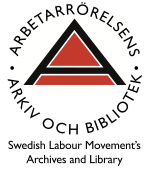by Klas Rönnbäck
Download first draft of Klas Rönnbäck’s chapter to ILOs “General Labour History of Africa: Servants, Masters and Rulers 16th to 19th Centuries” (a password is required to open the pdf which you receive when you register for the webinar 9/2 2021).
Abstract
There is an old idea, still prevalent today, that there was no wage labour in Sub-Saharan Africa until the continent was colonized by European powers in the late nineteenth century. There are plenty of sources from (European) observers from both pre-colonial and colonial times arguing that there simply was no labourers to be found for hire in various parts of Africa. It was, according to this line of thought, only with the colonization of the continent that a wage labour force really emerged. The same idea has ever since been prevalent also among scholars of African history. As for example Richard Sandbrook and Robin Cohen put it in an often-cited work on African labour history, “The creation of a wage-labour force in Africa is essentially a product of white settlement and the establishment of European colonial administrations.” (Sandbrook and Cohen 1975, 13; see also Gutkind, Cohen, and Copans 1978, 7).
The time when wage labour relations emerged in Sub-Saharan Africa has, however, been contested. Bill Freund has for example argued that wage labour existed well before the colonization of the continent (Freund 1988, 26), an argument that more recent scholars also have championed (see for example Rockel 2006, 5–6; Gunn 2019, 271). As colonialism was closely associated with the spread of a capitalist mode of production in Africa, wage labour would – if this line of argument is correct – have existed on the continent prior to the spread of capitalism, just as it had in many other parts of the world (van der Linden 2008, 46–47).
Other scholars, while agreeing that wage labour certainly might have existed in some parts of pre-colonial Africa, have however argued that it was rare and limited to certain particular trades or occupations. Gareth Austin has, for example, argued that while wage labour was not unknown in early modern West Africa, it was “vanishingly rare” (Austin 2009, 38). John Iliffe has, on a similar note, argued that – at least in the case of Southern Africa – porters were the only form of hired labour until the late nineteenth century (Iliffe 1983, 15–17). Several other scholars have in a similar vein argued that wage labour penetrated the continent comparatively late, and for a long time co-existed with other types of labour relations (Bellucci 2017, 134; Eckert 2019, 22).
There is no in-depth survey particularly focused on research on the historical developmet of wage labour in Sub-Saharan Africa. The present manuscript will be one chapter in the anthology General Labour History of Africa: Servants, Masters, and Rulers, 16th to 19th Centuries (ILO, forthcoming). The aim of the chapter is to survey the state of research on the development of wage labour in Sub-Saharan Africa during this period. The chapter will survey literature dealing with a number of issues, including the emergence of wage labour in Sub-Saharan Africa; the relationship between wage labour and other labour regimes; who worked for wages, and why they did so; why wage labour was so rare in Africa, comparatively speaking; the process of wage negotiations, and finally; the development of a class consciousness among the African wage workers.

